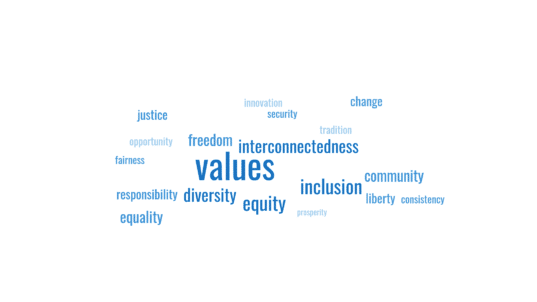Exploring preconceived notions
Dear collaborative discussion friends,
This week we are highlighting an activity that encourages participants to reflect on their own and others’ biases and assumptions in a nonjudgmental way. It uses a visual and tactile method to help participants explore these assumptions and practice suspending them. Participants then explore the effect that engaging in this exercise has on the discussion of a particular topic.
This activity is contributed by Lori Britt, Professor at the School of Communication & ICAD Co-Director at James Madison University, and is one of the many activities in the Critical Collaboration Module.
If you missed the previous newsletter, Anticipating Implications and (Un)Intended Consequences, you can access it and our other weekly newsletters by subscribing below.
This week’s activity:
Activity 3.3 – Awareness of Context, Bias, & Assumptions
Identifying and suspending biases and assumptions to improve communication
This activity helps participants uncover preconceived opinions or ideas they have regarding a particular topic. They dive deeper into understanding the meaning, sources, and context of these assumptions as a group. Participants also practice putting aside their biases and discussing the selected issue. They then reflect on what impact exploring each others’ biases and suspending their own assumptions had on the conversation.
Prepare for the Activity
This activity is best done in-person, although you can adapt it for an online space. Have desks for each participant that can be moved to form small groups or common tables that participants can sit around in these small groups. Also, have sheets of paper, pens or pencils, and tape for participants to use during the activity.
Select a Topic
Begin this activity by selecting a complex or controversial topic that is important for your discussion group. As preparation for this activity, consider Activity 5.1 Identifying Your Civic Passion. You can also introduce a topic to the group that you already selected. Provide participants with a discussion prompt in the form of a position statement relating to this topic. For example, for the topic of Universal Basic Income, the prompt might be: “The government should provide universal basic income for all citizens.”
Break into Small Groups and Individually Identify Biases and Assumptions
Invite participants to break into small groups (4-6 ppl). Ask them to individually jot down any preconceived notions, prejudgments, or preconceptions they have about the chosen topic on a sheet of paper. Remind participants that this is a safe, nonjudgmental space where they can be open and honest. Remind them that having biases is just part of being human.
If they are having trouble thinking about this, you could provide additional prompts to guide them, such as:
- What was your immediate reaction when you heard the statement? What was the first emotion you felt or the first thought you had?
- How might this reaction reveal your initial thinking or position about this topic?
- What values are behind your initial reaction or position?
- Which groups of people do you think support or oppose your position? Why?
- What are the underlying assumptions, stereotypes, or experiences that lead you to believe this?
Once they capture a few thoughts, ask them to identify key assumptions or biases on a piece of paper that they will then hang in front of their desk. Provide tape so they can stick the paper to the front of their desk. Explain to participants that by doing this they have now literally “suspended” their assumptions and biases relating to this particular topic.
Review “Suspended” Biases and Assumptions
Invite participants to take a look at what the other members in their small group have shared on their sheet of paper. Ask participants to briefly discuss these assumptions from a place of curiosity. Remind them to avoid debating or disputing the value of the assumptions shared. Encourage them to instead ask each other clarifying questions to gain deeper insight into these assumptions, such as:
- What do you mean by this?
- Where does this assumption come from?
- Can you give me an example or context for this?
Discuss the Chosen Topic
Now, having suspended their assumptions, have participants discuss the statement provided relating to the chosen topic. Encourage them to explore the various dimensions of the topic by referring to the Surround the Topic diagram from Activity 3.5 Seeking Divergent Thinking and Perspectives. They can also use this Identifying Stakeholders worksheet from Activity 5.2 Developing an Awareness of Stakeholders to think of the different stakeholders involved and try to view the topic from the various perspectives of these stakeholders.
Debrief as a Full Group
Come back together as a full group and discuss:
- What impact, if any, did “suspending” your assumptions have on your own contributions to the discussion?
- How did knowing the assumptions of others affect your own communication in the group?
- Did you communicate differently with any individual because of their assumptions? Because of your assumptions?
In addition to these debriefing questions, the full description of Activity 3.3 Awareness of Context, Bias, & Assumptions includes reflection questions, a practice journal prompt, and additional resources to help participants dive deeper.
If you try out this activity, please share with us what you think:
We hope this toolkit activity helps participants openly reflect on their biases and assumptions about a particular topic and explore the effect suspending their own and knowing others’ preconceived notions has on their communication as a group.
Upcoming Events
- The Jonathan M. Tisch College of Civic Life at Tufts University is hosting Frontiers of Democracy 2023: Religious Pluralism and Robust Democracy in Multiracial Societies, from July 13 (5 – 7 PM) to July 15 (noon) at the Joyce Cummings Center (177 College Ave, Medford, MA). The cost is $240 for a standard ticket. Discounts are available for students and community partners. Learn more here. Registration ends on July 9, 2023. All are welcome! Register and purchase tickets here.
- We are now accepting applications for our Pilot Coach Training for Undergraduate Students which will take place this fall. Space will be limited. The application deadline is August 13, 2023. All undergraduate students who are interested can apply here or you can share this link with students who might be interested.
Looking forward to collaborating,
Ritu Thomas & the Collaborative Discussion Team





